Key takeaways:
- Finding a work-music balance involves scheduling time for both to manage stress and foster creativity.
- Effective time management and prioritization are essential for integrating music into a busy professional life.
- Utilizing music strategically can enhance focus and emotional well-being during work tasks.
- Personal reflection through music can guide self-awareness and inspiration in both personal and professional realms.
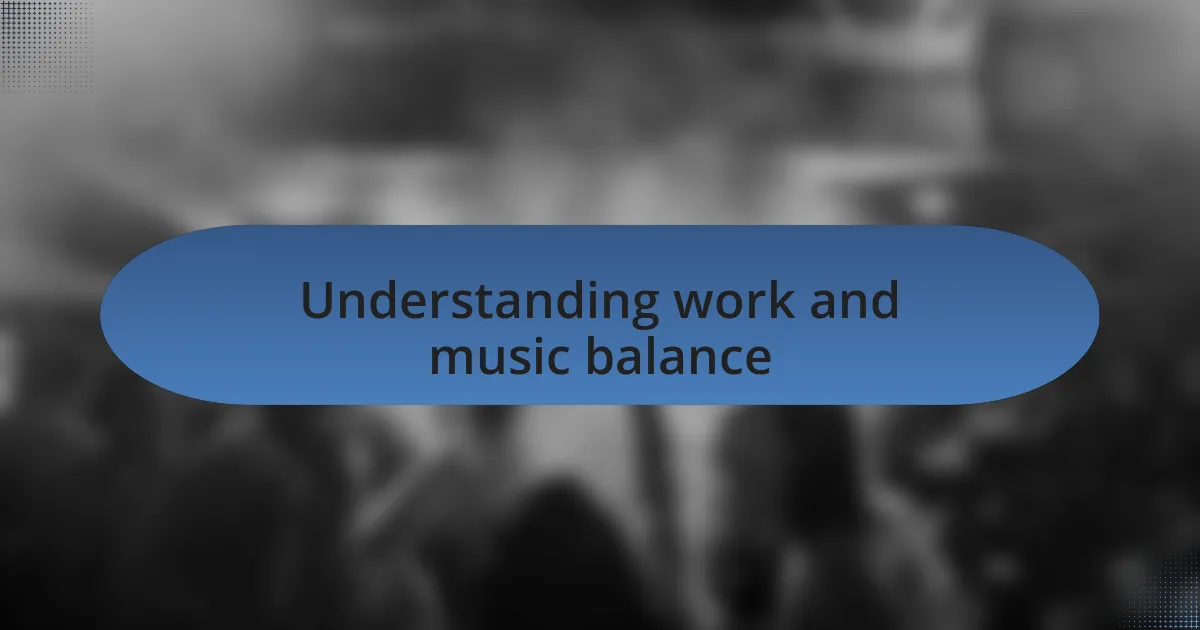
Understanding work and music balance
Finding a balance between work and music can feel like navigating a tightrope. I remember a time when I was buried in deadlines but just needed a moment to play guitar. That brief escape recharged me, proving that even a little music can make a world of difference in managing stress.
Sometimes I wonder, how can we ensure that our passion for music doesn’t become a casualty of our professional lives? I’ve seen colleagues who quit music entirely because of work demands. It’s heartbreaking, especially when I know how transformative music can be, both as a creative outlet and a source of joy.
Compartmentalizing tasks has helped me maintain this balance. On busy days, I set specific time blocks for work and dedicate other slots purely to music. This not only keeps my productivity on track but also allows me to immerse myself in creativity without guilt. Have you ever tried scheduling your passion? The results can be eye-opening!
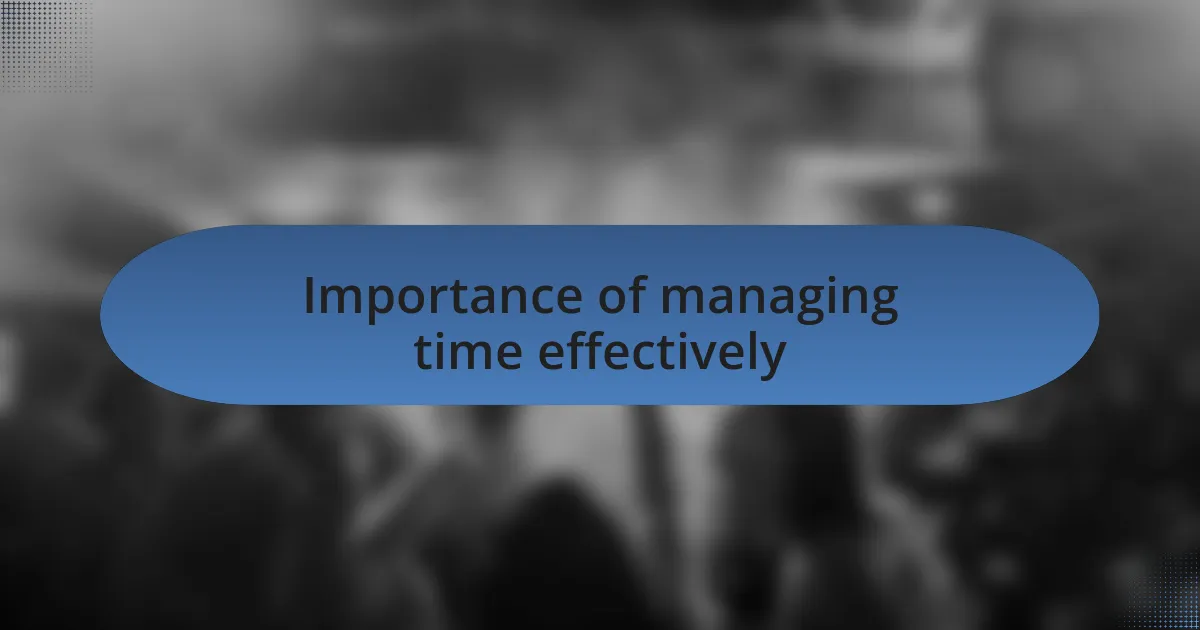
Importance of managing time effectively
Effective time management is crucial for harmonizing work and music. I learned this lesson the hard way during a particularly chaotic week when I misjudged how long tasks would take. I found myself overwhelmed, sacrificing time that I normally reserved for music practice. After that, I realized that by prioritizing my schedule and setting clear boundaries, I could prevent stress from taking over my passion.
Another aspect of managing time effectively is enabling creativity to flow without interruption. I often set aside “music moments” in my calendar, treating them as non-negotiable appointments. This approach not only keeps me accountable but also encourages spontaneity; sometimes, I even surprise myself with new ideas that emerge during these dedicated sessions. Have you carved out your creative blocks? You might be amazed at what you can discover when you give yourself that space.
Moreover, the emotional benefits of managing my time wisely have been profound. I recall an evening when I left my work behind to dive into songwriting, letting go of the day’s stresses. That decision not only replenished my spirit but also sparked inspiration that fueled my work the following day. Reflecting on these experiences, it becomes clear that finding a rhythm in time management can lead to a more fulfilling life, both in our careers and passions.
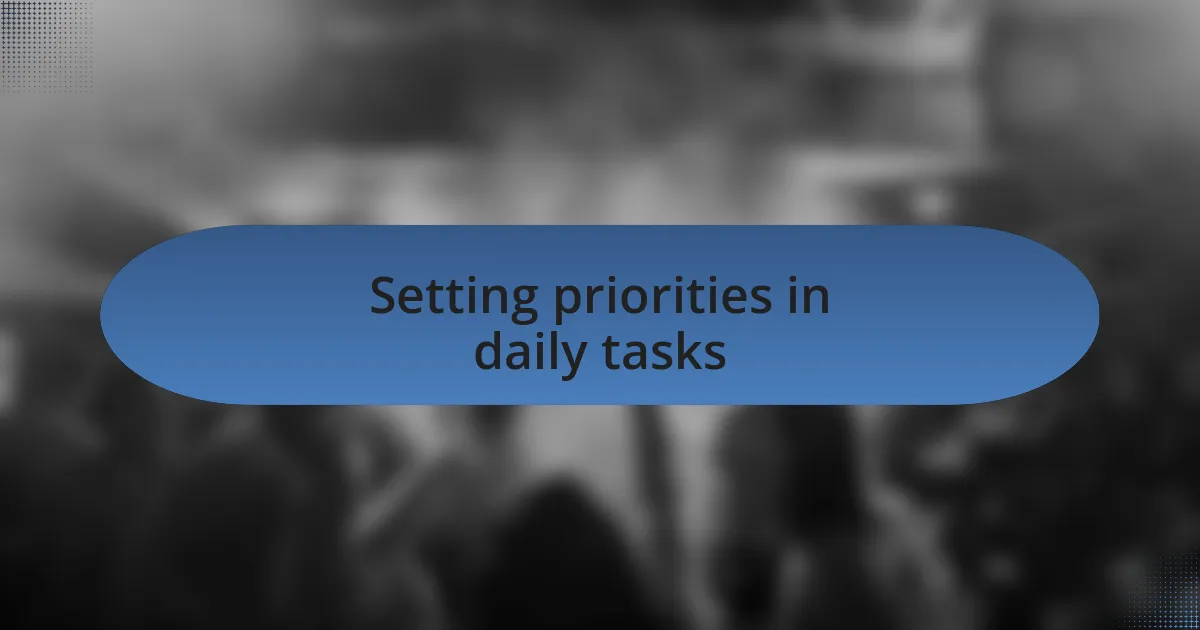
Setting priorities in daily tasks
Setting priorities in daily tasks requires a keen awareness of what truly matters to us. I remember a day when I was caught in a whirlwind of emails and meetings, and I suddenly realized that I hadn’t touched my guitar. By the end of the day, I felt drained, and the music I love was nowhere near my mind. That experience taught me to categorize my to-do list: urgent, important, and less so. This way, I can ensure that my creative pursuits get the attention they deserve, ranking them alongside my professional responsibilities.
Sometimes, we overlook the importance of saying “no” to tasks that don’t align with our goals. I recall agreeing to a project that seemed enticing but ultimately consumed time I could have spent working on my music. Learning to prioritize meant evaluating every commitment through the lens of my personal and artistic growth. So, I ask you, how often do you weigh your obligations against your passions? A simple re-evaluation can lead to more fulfilling days.
Another tactic I’ve employed is breaking down my tasks into smaller chunks. For instance, instead of facing an overwhelming project all at once, I set aside 30 minutes to focus solely on it. It’s surprising how such a small alteration can free up time for songwriting or listening to new tracks. This approach not only boosts productivity but also opens up my day for creativity. Remember, it’s about finding that delicate balance and striking chords in both work and art.
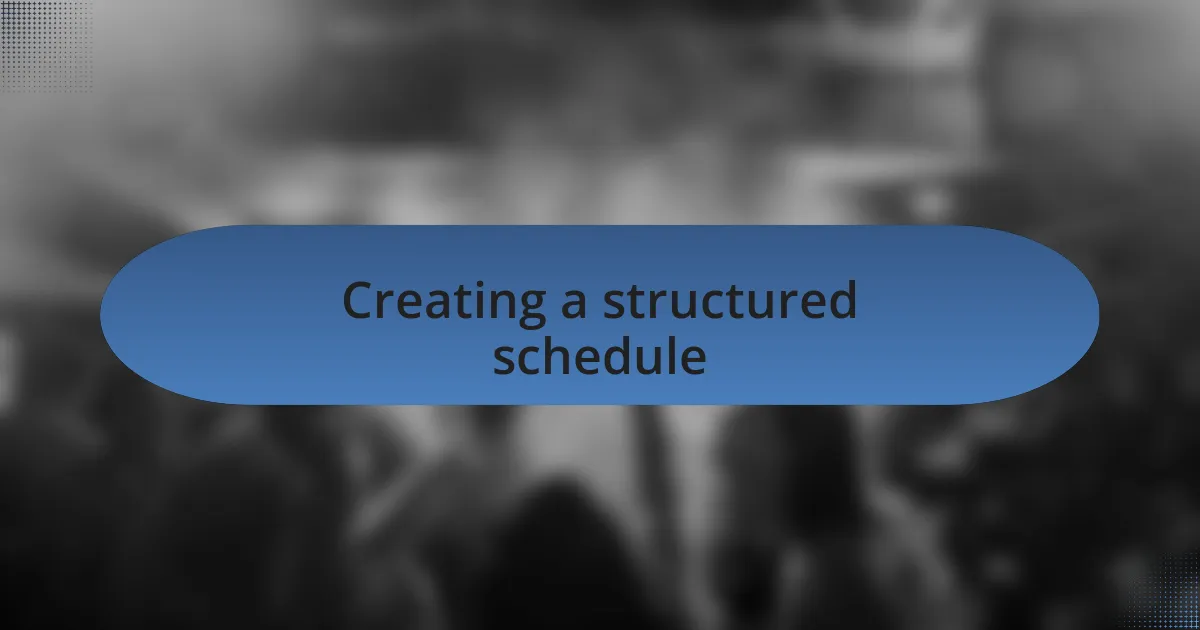
Creating a structured schedule
Creating a structured schedule is like composing a well-balanced song; every note has its place. I’ve found that setting specific time slots for both work tasks and music practice helps me stay on track. For example, my mornings are often dedicated to emails and meetings, while late afternoons are reserved for songwriting. This rhythm not only boosts my productivity but also keeps my creativity alive.
I’ve learned that flexibility is key when crafting my schedule. There are days when inspiration strikes unexpectedly, and I need to rearrange my plans to capture that moment. I remember one instance when a melody popped into my head during a work meeting. Instead of ignoring it, I quickly jotted down the idea, which ultimately flourished into a full song. Do you allow space for those spontaneous bursts of creativity in your routine?
To keep my structure effective, I regularly review my schedule and adjust it as needed. This practice has become essential, especially when I notice that my focus is wavering. By keeping my music sessions brief yet frequent, I ensure they remain a vital part of my daily rhythm. How about you? Do you take the time to reassess your schedule to make room for what you love? Finding that sweet spot between professionalism and passion can truly elevate your daily life.
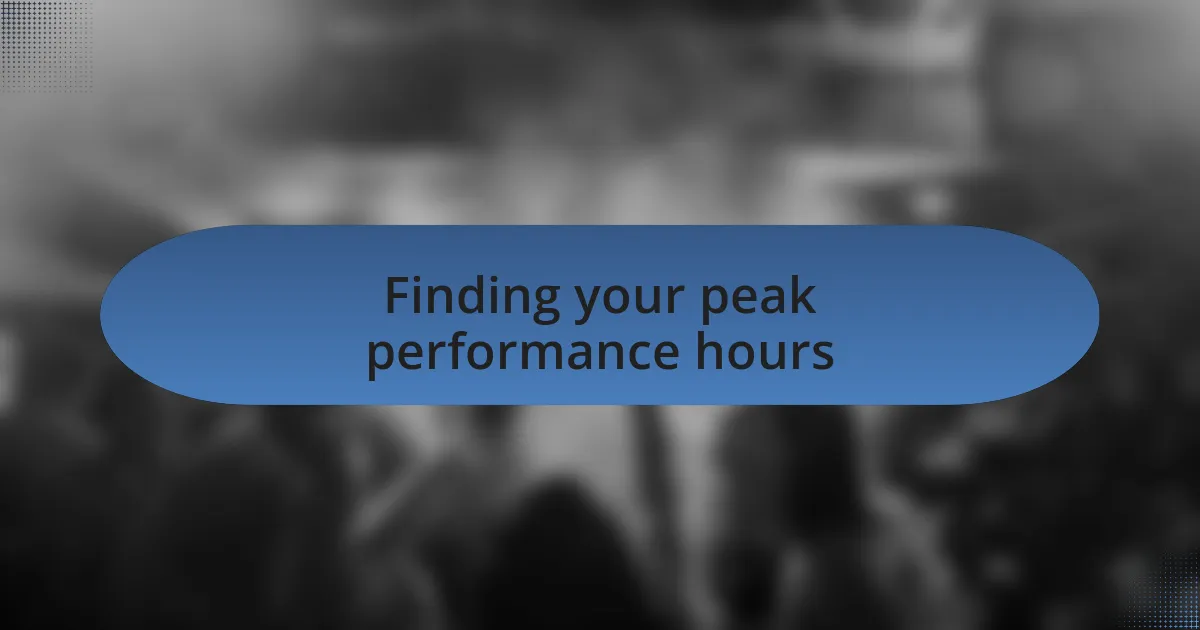
Finding your peak performance hours
Finding your peak performance hours involves tuning into your body’s natural rhythms. I’ve discovered that I am most energized in the mornings, around 9 AM to 11 AM. During this time, I can fall into a creative flow, whether I’m drafting a song or strategizing marketing plans for our artists. Have you noticed times when your mind feels particularly sharp and ready to tackle challenges?
I remember grappling with a creative block one afternoon. Frustrated, I took a break and went for a walk. Surprisingly, the ticking clock didn’t matter; as I strolled, ideas began to flow, and I returned not only invigorated but bursting with concepts for both my work and music. This experience made me realize that my peak performance doesn’t always align with traditional working hours. How often do you actively explore different working conditions to find your rhythm?
Experimentation has been vital in identifying my ideal working hours. I’ve set aside certain days to track my energy levels and productivity across different times. For instance, late afternoons are often sluggish for me, signaling it’s time for a music break or an activity that sparks joy. Reflecting on your own experiences, have you considered logging your productivity trends to help pinpoint your peak hours? Recognizing these patterns has been a game-changer for me, intertwining both my work and passion in a fulfilling way.
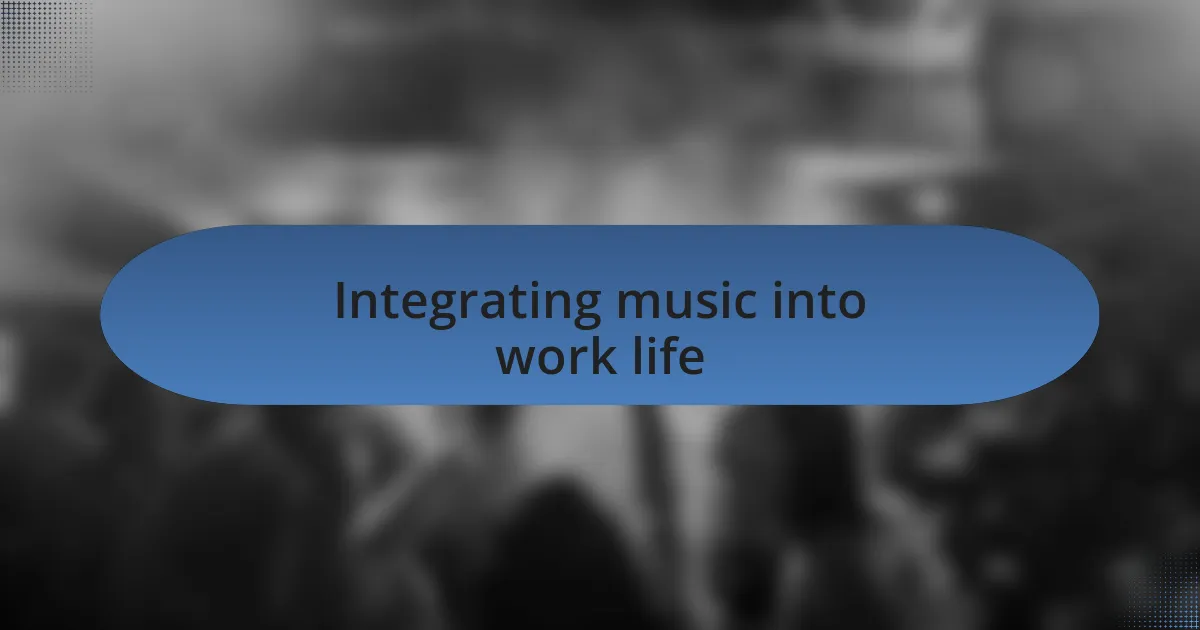
Integrating music into work life
Integrating music into my work life has been a transformative experience I never expected. For me, the right playlist can create an atmosphere that fuels my focus and creativity. I often find myself curating soundtracks that resonate with the tasks at hand, whether it’s a smooth acoustic set for content creation or upbeat tracks to power through a marketing report. Have you tried tailoring your musical choices to your workload?
Once, I had a deadline looming for an important project and felt the pressure mounting. Instead of succumbing to anxiety, I put on my favorite instrumental album. It was astonishing how quickly my stress melted away, and I could dive back into work with renewed enthusiasm. Music has a way of shifting our emotional state—it’s almost like a secret weapon I rely on to enhance my productivity.
I also realized that taking short music breaks throughout the day can work wonders. After a couple of hours glued to my screen, I’ll hit play on a high-energy track and dance around my office. This little exercise not only lifts my spirits but also resets my focus. Isn’t it fascinating how something as simple as a few minutes of music can rejuvenate our minds and keep us in sync with our creative pursuits?
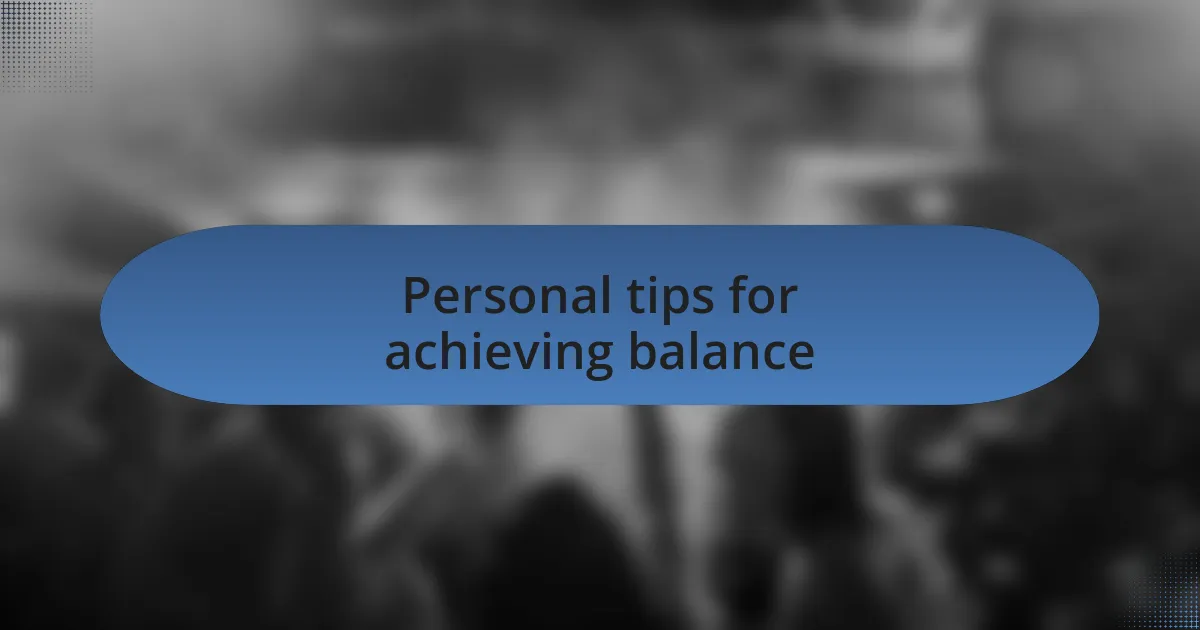
Personal tips for achieving balance
Finding balance between work and music can sometimes feel like a tightrope walk. One key tip I’ve embraced is scheduling my music time just like any other work task. For instance, I set aside 30 minutes each afternoon to not just listen but to actively engage with new tracks, reflecting on how I can use them creatively. It’s surprising how this designated time helps clear my mind and enhances my productivity later on. Have you thought about blocking time for music in your daily routine?
Another approach I’ve found beneficial is weaving music into my workflow. When I take calls or write emails, I choose background tunes that align with the vibe I want to convey. One afternoon, I played a soulful jazz playlist during a client call, which not only eased my nerves but also set a relaxed tone for the conversation. This small change made me realize how music can shape our interactions in ways we often overlook. Do you ever consider how the soundscapes you create can influence your professional relationships?
Finally, I’ve discovered the power of reflection through song. After particularly intense days, I take a moment to think about which songs resonated most with me. This reflection doesn’t just help me process my emotions; it also allows me to identify what inspires me. Once, after listening to a powerful ballad, I found clarity about a project I was stuck on. It’s like music serves as a mirror to my thoughts, guiding me to a better understanding of myself and my work. How often do you allow music to guide your self-reflection?